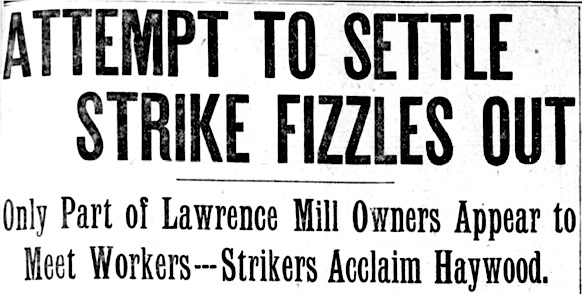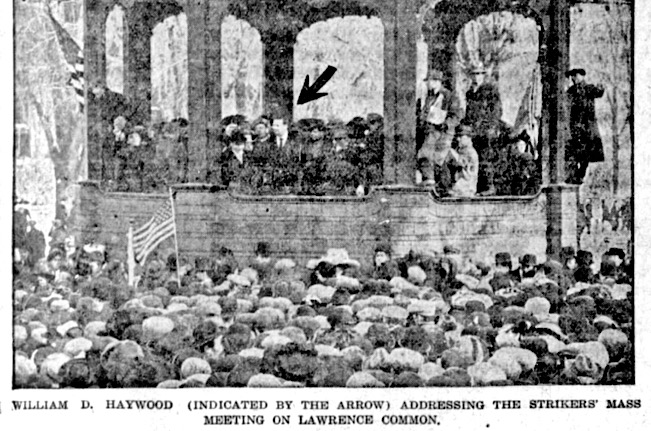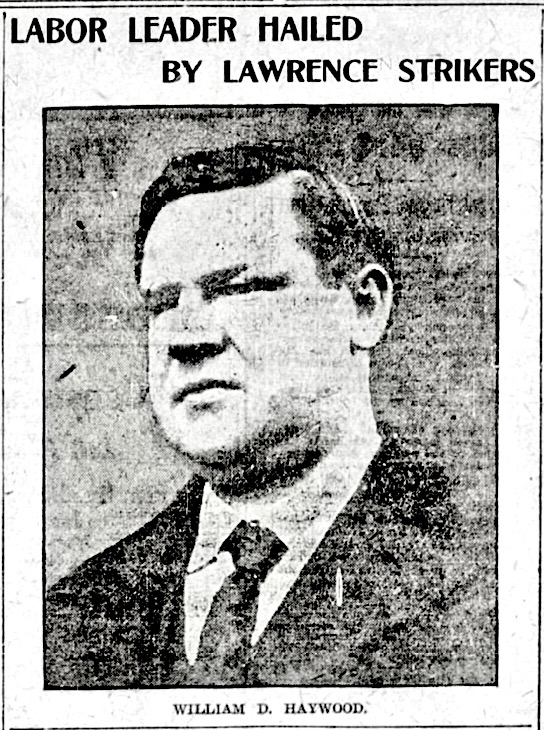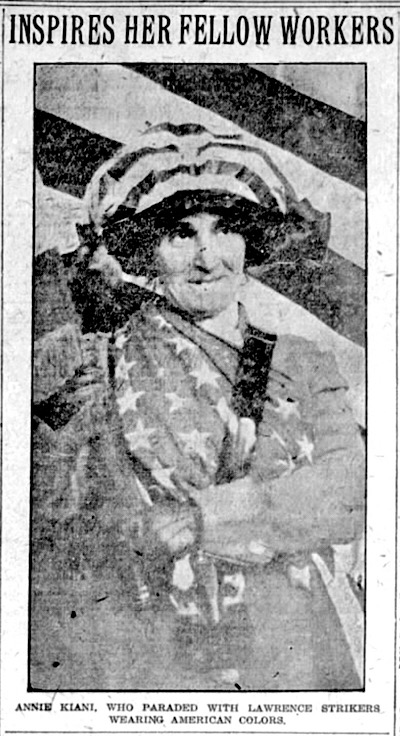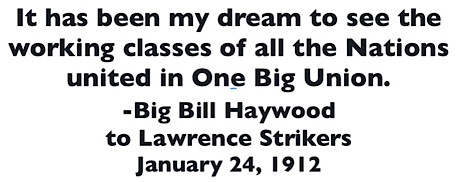 —————
—————
Hellraisers Journal – Saturday January 27, 1912
Lawrence, Massachusetts – Big Bill Haywood Arrives to Cheering Crowds
From The Boston Daily Globe of January 25, 1912:
By F. P. SIBLEY.
LAWRENCE, Jan 24-The first attempt to hold a conference between the striking employes of the textile industry and the mill owners and mill agents fizzled flat tonight.
The mill owners’ representatives did not all come to the meeting in City Hall. Nobody appeared for the Kunhardt, the Duck, the Pemberton nor the Arlington Mills. Of the seven men representing the other mills, all but two left almost immediately.
The strikers’ committee was then told that the mill agents who were there had not sufficient authority to treat with them. “We’re wasting our time,” said a strikers’ delegate and the strike committee adjourned to its own hall.
[…..]
Greeting to Haywood.
In the meantime [while Ettor was in conference with the Mayor] the scenery was setting for the first big spectacular event of the day. For two hours the strikers and their sympathizers, with tour bands, were gathering at the North Lawrence Station to greet William D. Haywood, the famous labor agitator, whose coming has been so eagerly expected here.
He reached town at 11:30 a. m, and considered strictly as a parade, the march of strikers and sympathizers was best represented by the single motto that was carried, “All in One.” It was an unorganized crowd of probably 10,000 people that filled Common st closely packed and jostling from wall to wall.
Considered however, as a demonstration, no President ever had a finer or more enthusiastic reception. Not a policeman, not a soldier was in sight. The marchers policed their own route. They held up, forcibly, wagons, whose drivers tried to move their horses, and it kept itself roughly in line.
The great majority of the crowd were foreigners and the bands were the Franco-Belgian, Italian and Polish; the Syrians sent their St. Joseph Drum Corps. All the musicians served without pay.
—–
Crowd In a Jubilant Mood.
The morning was bright and warmed up fast, and the great throng waiting the little square got into a jubilant mood. One band after another played the songs of Socialism, the Garibaldi hymn, the “Internationale,” the “Marsellaise.” The crowds sang and then cheered their own singing.
The train pulled in on time, August de Tollanear standing on the steps of the first car. Mr Haywood was immediately behind him and was recognized by the crowd. A slow, thrilling cry arose frond the crowd and continued-a long-drawn, not unmusical sound that went on and on as if it would never stop. As a matter of fact, it never did stop until the “parade” was well under way.
Haywood descended into the crowd which swirled into fighting vortexes, trying to get near him. A small volunteer bodyguard formed up round him and slowly pushed away through the dense crowd.
The bands were hopelessly stalled in the throngs. Some few flag bearers managed to force themselves up near Haywood and his escort, and the whole vast multitude got slowly under way.
There was no attempt at forming a column and men ran round by Essex st and cut through the first cross street back to Common st. The sidewalks here were packed to the last inch; but the pressure became so great that even the lookers-on presently found themselves drifting along in the great irresistible stream.
—–
Power of Sheer Numbers.
It was an impressive hint on the power of sheer numbers-this crowd, good natured and happy now, shouting along the half-mile march, in the bright sunshine, with flags waving and every prospect of a happy ending of the strike within a day or two. But it was impossible to overlook the possibility of a change in that crowds temper, with no loss of its power. And not a thoughtful man could see it and not think-how if it turns.
Close about Haywood it pressed, so that all the protection of the men who tried to keep a space about him was unavailing. He stumbled rather than walked over the route. Yet he kept a fine dignity. He bulked large among the rather undersized men of the Latin men about.
About 1000 men had got ahead of him in the parade, but the first group of flags managed to stay near him. Then came perhaps another thousand men and women-a really large number of women-and then another group of American flags and a band.
The route was short-merely to the strike committee’s hall at 325 Common st. And there the paraders came to a dead stop, utterly choking Common st from the Common itself back for four or five blocks and overflowing into the side streets.
—–
Promised a Hearing.
Haywood disappeared at once and did not appear again. But the people would not move. Finally Joseph Ettor, chairman of the strike committee, leaned out from an upper window. He could still the cheers and applause, for he has his people under wonderful control. But the bands were different. If one stopped another struck up. Finally he got silence, comparatively speaking.
“You can disperse now,” he shouted, “and come to the mass meeting on the Common at 2 o’clock. Mr Haywood will speak then. And this he repeated in Italian.
It was hard to get the crowd under way, but finally one band led off and the pressure from behind did the rest. ‘The strikers were not yet ready, however, to disperse and with continually lessening numbers went on a long parade down Common st and back up Essex st. They were still marching an hour and a half after Haywood’s train had pulled and only a little more than half an hour before the hour set for the mass meeting.
[The largest crowd?] yet seen during the strike was waiting on the Common. It had turned very raw and frequent snow squalls drifted across the sky, though the sun shone most of the time. The enthusiasts hoisted themselves into the bandstand half an hour before the time set for the meeting. Promptly at 2 the committee began, clearing them out again to the amusement of the huge crowd.
The Syrian Independent Fife and Drum Corps arrived and insisted on helping to pass away the time. There were four manful but ineffectual fifes, three very effective snare drums, cymbals and a bass drum that could not have been better. One recognized the tunes mainly by the rhythm, not the melody. The fifes got the worst of it every time.
The drum corps played an extensive repertoire and went away. The committee made a fine clearance then-and in five minutes the stand was packed again.
The people wanted to see Haywood-wanted a near view of him. Both he and Ettor are the objects of a devotion that is wonderful; to the thousands of strikers the wish of these men is law in minor matters, though there is a sturdy independence as to big decisions. But the personal hero-worship is undeniable.
It was cold waiting and the crowd occupied the time by skylarking and cheering the dozen or so of American flags which were waved from the stand.
—–
Addressed by Ettor.
At 2:40 Ettor appeared at the rail. He said:
This this meeting is another and more impressive affirmation that so far as the workers are concerned there is but one basis for settlement- that is that the settlement, whatever it is, shall affect all the workers.
There have been all sorts of rumors and the bosses have stepped down from their position, that they would not deal with all the strikers together. It it asserted by the Mayor and Col Sweetser that there will be a meeting tonight in City Hall, at which the Council, representatives of the corporations and your representatives will be present.
It has finally been decided by your committee that the strike committee will be present on just one condition-that representatives of the manufacturers be there. If any of the corporations are not there your strike committee will withdraw from the conference without much ceremony.
The next time we gather here it will be either to keep the ball rolling to the end that means all bitterness, or else to celebrate our victory.
—–
Haywood Introduced.
Arthur Giovanniti [Arturo Giovannitti] repeated the speeches in Italian and John Panoffski in Polish. Then John Mullen of the Haverhill Shoe Workers said that he had been sent to convey a Christmas present and called on Sec Pothier. He waved a fat package of currency, which was said to contain $900. “And there’s as much more coming,” he said.
At last “Bill” Haywood was introduced. He spoke with great force, and his every point raised an explosion of cheers. He said:
Mr Ettor has told you how it has been my dream to see the working classes of all the Nations united in one big union.
You in Lawrence today have every reason to carry this idea into effect. Without one big union you will be forced back into the mills and be in a worse position than ever. It behooves you to stand steadfastly by this strike. You are going to win, and can prevail as long as you are loyal to yourselves.
I read in the papers that Lawrence is afraid of my coming to town. But it is not Lawrence that is afraid; it is the managers, superintendents and owners of these mills who fear my coming. I am not afraid to come to the city guarded as it is by soldiers.
It is a familiar setting to me. I have been in other strikes where the soldiers were on hand, but I never saw a strike yet defeated by soldiers. (Cheers.)
—–
Urged to Self-Control.
Is only necessary to keep the rein on yourselves. If we can interest other workers who come in contact with the goods you produce, we can prevent the railroads from bringing in supplies and coal. We can shut off the power and we can starve out the soldiers and make them walk back to where they came from.
By one big union, and only so, can this fight be won. I have seen it in London, where all railroad traffic was stopped and the officials had to ask Ben Tillett for permission to haul forage to their starving horses.
I saw the same thing in France, where all men and women have just one card. They stopped the railroads and won the strike in three days.
—–
Will Rouse the West for Help.
The time is not remote when the workers will be in such shape that, when one city goes on strike the mills in every other city in the United States will close. And the time is coming, too, when instead of going on strike, you will continue in the mills and lock the bosses out once and for all.
The working people of the country know what you are doing here. I am going West and everywhere I shall tell the people that you people need money and provisions and that they must give you every support.
Now trust your own committees and remember that this question will never be resolved until you solve it yourself.
With this the meeting resolved itself into a monster parade, and through the sudden squalls of snow, in golden sunlight all the time, marched east to the Everett mills, back through Essex st and along around through the residential district to the eastward.
—–
—————
[Emphasis added.]
~~~~~~~~~~~~~~~~~~~~~~~~~~
SOURCE & IMAGES
The Boston Daily Globe
-Morning Edition
(Boston, Massachusetts)
-Jan 25, 1912, p1+4
https://www.newspapers.com/image/430628318/
https://www.newspapers.com/image/430628324/
See also:
Tag: Lawrence Textile Strike of 1912
https://weneverforget.org/tag/lawrence-textile-strike-of-1912/
Jan 25, 1912, Boston Globe-Attempt to Settle Lawrence Strike Fizzles Out
https://www.newspapers.com/clip/93498695/jan-25-1912-boston-globe-attempt-to/
https://www.newspapers.com/clip/93498818/jan-25-1912-boston-globe-attempt-to/
Garibaldi’s hymn
https://www.loc.gov/item/ihas.200001800/
Giuseppe Garibaldi
https://en.wikipedia.org/wiki/Giuseppe_Garibaldi
~~~~~~~~~~~~~~~~~~~~~~~~~
La Marseillaise – Monsieur Jack

